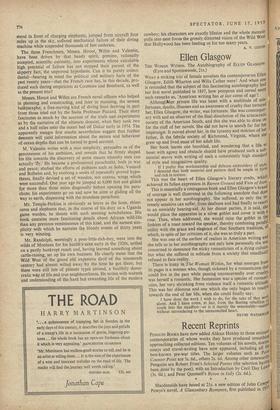Ellen Glasgow
THE WOMAN WITHIN. The Autobiography Of ELLEN GLASGOW. (Eyre and Spottiswoode, 21s.) WHAT a striking trio of female novelists the contemporaries Ellen
Glasgow, Edith Wharton and Willa Cather were! And when one is reminded that the subject of this fascinating autobiography had her first novel published in 1897, how pompous and unreal sewn such remarks as, 'American writing has at last come of age' I AlthougLLher private life was beset with a multitude of mis' fortunes, deaths, illnesses and an awareness of cruelty that tortured
her, Ellen Glasgow, the writer, was fortunate. She was contempor- ary with and an observer of the final dissolution of the aristocratic society of the American South, and this she was able to draw on for the stuff of her novels. She did not have to search far for her
inspiratken. It moved about her, in the and stoicism of her father, in the febrile society of Richmond, Virginia, where she grew up and lived most of her adult life.
Her book leaves one humbled, and wondering that a life so
beset with agony and obstacle should have produced such a sub- stantial oeuvre with writing of such a consistently high standard
of style and imaginative quality.
If I prefer tine workmanship and delicate embroidery of style. I demand that both material and pattern shall be ample in form and rich in texture.
This was the heart of Ellen Glasgow's literary credo, which
achieved its fullest expression in Barren Ground and Vein of Iron. This is essentially a courageous book and Ellen Glasgow's brand of courage is well illustrated in the following anecdote that does not appear in her autobiography. She suffered, as only the in' tensely sensitive can suffer, from deafness and had finally to resort
to an unwieldy hearing-aid. At her dinner parties, it is said, she would place the apparatus in a silver goblet and cover it with a
rose. Then, when addressed, she would raise the goblet in the fashion of a toast toward the speaker,,thereby combining painfill utility with the 'grace and elegance of that Southern tradition, of which, in spite of her criticism of it, she was so truly a part. She was one of the earliest of realists in American writing and
she tells us in her autobiography not only how personally she was concerned to denounce the sticky romanticism of a dying culture,
but what she suffered in solitude from a society that steadfastly refused to face reality.
There is irony in The Woman Within, for what emerges from its pages is a woman who, though sickened by a romanticism that could live in the past while passing unconcernedly over cruelty'
was herself a romantic. Her humanism was a species of romanti"
cism, her very shrinking from violence itself a romantic attitude' This was her dilemma and one which she only began to resolve towards the end of her life, when she could finally say : I have done the work I wish to do, for the sake of that wort alone. And I have come, at last, from the fleeting rebellion 0, youth into the steadfast—or is it merely the seasonable—accord without surrendering to the unreconciled heart.
DAVID WATMODO°


































 Previous page
Previous page